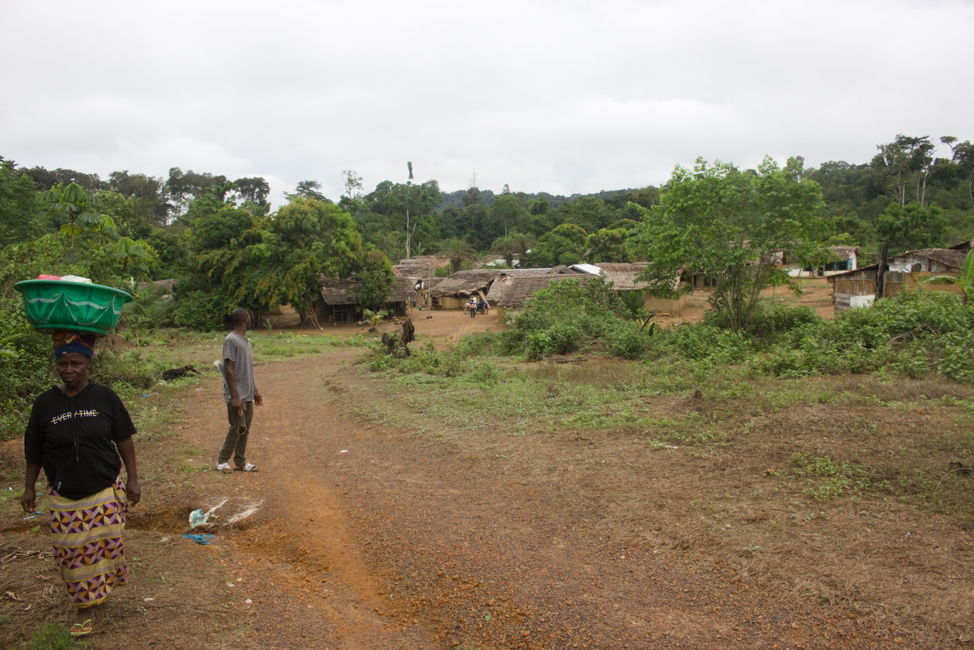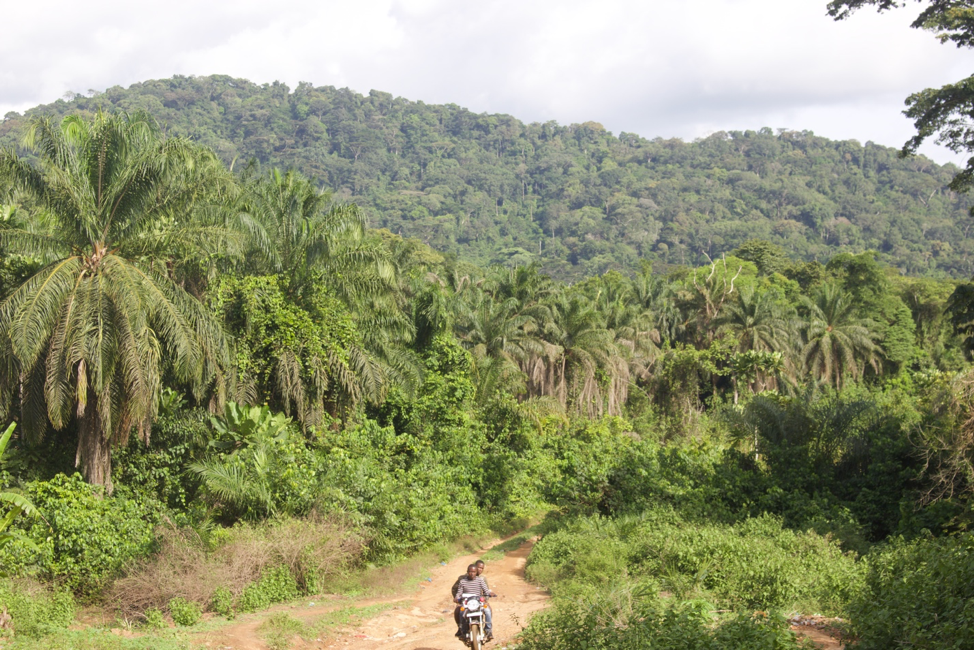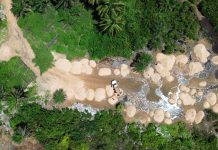Top: Vanjah Village is one of the communities affected by an illegal subcontract deal between Bassa Logging and Alma Wood. The DayLight/James Harding Giahyue
By Varney Kamara
Editor’s Note: This is the first of a series on the aftermaths of timber sales contracts (TSCs), which were canceled in March 2021 following years of illegitimacy.
MONROVIA – The Forestry Development Authority (FDA) awarded and approved five contracts—meant for companies with majority Liberian shareholders—to foreign companies, a violation of forestry laws and regulations. Some of the illegal contracts lasted for over a decade before they were recently canceled, an investigation by The DayLight has found.
Between 2008 and 2009, the FDA awarded timber sales contracts (TSCs) to Akewa Group of Companies, Thunder Bird Company and Sun Yeun Company. It also approved a subcontracting deal between Bassa Logging and Alma Wood for patches of forests in Grand Bassa and Grand Cape Mount Counties.
Under the National Forestry Reform Law of Liberia and the Ten Core Regulations, TSCs, which cover 5,000 hectares, are meant for only firms with at least 51 percent Liberian shareholding. However, Akewa is a Nigerian-owned company, Thunder Bird, a Lebanese and Sun Yuen, a Chinese enterprise and Alma Wood Lebanese-Senegalese, according to the companies’ articles of incorporation. In fact, only two percent of all four companies’ shares are held by Liberians.
A Nigerian businesswoman, Abigail Funke Odebunmi, has 60 percent, followed by Chief Kenneth Amazeika and Timothy Odebunmi with 20 percent apiece. It was unclear whether the company met that requirement when it obtained TSC A3 in Grand Bassa in 2008, as Akewa’s article of incorporation does not show its initial shareholders. Nevertheless, the company’s current ownership status indicates Akewa was barred under the “Liberianization” clause of the law. The company initially registered at the Liberian Business Registry on June 29, 2009, proving it did not have a business registration certificate when it obtained TSC A3 a year earlier. That was a violation of the Business Corporation Act of 1976 and the FDA Ten Core Regulations on prequalification. Akewa had been involved in the infamous Private Use Permit (PUP) Scandal, in which some 2.5 million hectares of forests, or 23 percent of the country’s landmass, were illegally awarded to logging companies.
Odebunmi did not respond to our request for an interview on Akewa’s shareholding.
Thunder Bird, which was awarded TSC A08 in Porkpa District, Grand Cape Mount County, is equally owned by Lebanese brothers Tony Ayoub and George Ayoub. The DayLight was not successful in contacting Thunder Bird.
A Chinese businessman, Wei Zhang holds 98 percent of the shares of Sun Yeun, which held TSC A15 and A16 in Gola Konneh Porkpa District, Grand Cape Mount. Liberian businessmen Erik Bauman Vincent and Josephus Banks have one percent each to complete the firm’s shareholding.
C. Mike Doryen, the managing director of the FDA, said the agency would investigate the companies and use its findings for future reference. “If it was an error made, we are guided so that we don’t repeat the same thing,” Doryen told The DayLight in an interview at the FDA’s headquarters in Whein Town, Paynesville. “I will check on it myself and get my research people to check and see exactly what it is.”
After being unlawfully awarded TSC A16, in 2016 Sun Yeun subcontracted the concession to Alma Wood, a company owned by Lebanese businessman El-Zein Hassan and his Senegalese partner Radwan Darwiche. Both men have 250 stocks apiece, which barred them from obtaining the contract but the deal still went on.
Two years later, Alma Wood was also subcontracted by Bassa Logging Company, a 100 percent Liberian-owned business, which operated TSC A11, situated between the Gola Konneh and Porkpa Districts.
Josephus Banks, one of Sun Yeun’s two Liberian shareholders, claimed that the company amended its legal document to meet the shareholding requirement for TSC before acquiring the concession but showed no proof. The firm’s legal document shows that Sun Yeun has not amended its article of incorporation since it was established in 2008.

Banks blames the FDA for Sun Yeun’s illegal subcontract with Alma Wood. “If Alma Wood’s prequalification document is fake, then we blame the FDA for that because it is FDA that qualifies companies,” Banks told The DayLight in an interview in Monrovia. He was making a reference to Regulation 104-07, which mandates the FDA to only prequalify companies if they meet the Liberian-shareholding requirement.
FDA claims Alma Wood’s subcontract was legal though the law shows otherwise. “Operational agreement has nothing with concession agreement between the government and Liberians. Once you have your TSC, you can do an operational agreement,” Doryen said.
His claims were refuted by a lawyer knowledgeable about the forestry sector, who spoke to The DayLight and did not want to be named for fear of reprisal. “Of course, once a stated requirement is not meant, that is a breach of the law,” the lawyer said.
Efforts to reach Alma Wood did not materialize, as the company has ceased to operate since 2019. Its co-owner and CEO Hassan reportedly fled Liberia after he was sued over his failure to repay a US$643,000 loan he had taken from the Afriland bank.
Clarence Massaquoi (not the lawmaker), the CEO of Bassa Logging, also did not respond to queries for comments on the matter.
Awarding the five contracts to the four foreign firms undermined the intent of the forestry laws and regulations to empower Liberians. During the Liberian Civil War (1989-2003), foreign logging companies ran the sector, using proceeds to fund warring factions, according to Liberia’s Truth and Reconciliation Commission (TRC), in what became to be known as “conflict timbers” or “logs of war.” Consequently, the United Nations imposed sanctions on Liberian timbers in 2002, overseeing a three-year reform of the wartorn industry. The reform addressed the marginalization of Liberian businesspeople, with exclusive stakes in certain contracts, including TSCs.
“In an effort to re-establish a vibrant domestic forestry sector, the government shall accept bids on forest management contracts covering a land area of between 50,000 and 99,999 hectares only from qualified bidders that demonstrate at least 51 percent ownership by Liberian citizens,” reads the National Forestry Reform Law. “If no qualified Liberian bidders present tenders for the contract or secure the contract during one bidding cycle, the [Forestry Development Authority] may re-bid the contract through a process open only to qualified bidders that demonstrate 51 percent ownership by Liberian citizens.”
The law mandates the FDA to make a report to the National Legislature on the impact of that portion of the law on the country’s economy. However, that report has not been made since 2006. C. Mike Doryen, the managing director of the FDA, said the agency would write the report later this year.
‘Inconsistent with the laws’
The five illegally awarded TSCs undermined the economic empowerment pillar of the Pro-Poor Agenda for Prosperity and Development. President George Weah promised in his Inaugural Address not to make Liberians “spectators in their own economy. My government will prioritize the interests of Liberian-owned businesses and offer programs to help them become more competitive and offer services that international investors seek as partners,” President Weah said at the time.
All five unlawful TSCs awarded to the three companies and six others overstayed their legal timeframe, our investigation also found. By law, TSCs run for three years and can be extended by two years, totaling a five-year maximum period.
Having been issued between 2008 and 2009, they should have all expired by 2014. Finally, in March last year, the board of directors of the FDA discontinued all 11 TSCs, saying that its decision in 2017 to allow the contracts to continue was “inconsistent with the laws governing forest management.”
This story is a production of the Community of Forest and Environmental Journalists of Liberia.





Facebook Comments